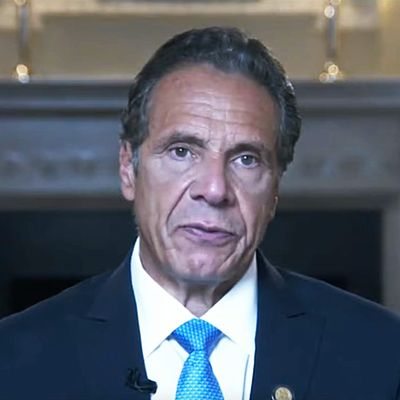
Andrew Cuomo had one last opportunity to take responsibility as governor. For the sexual harassment, for the nursing-home deaths, for the way he used state resources on his COVID-19 memoir. He declined to do so in his pretaped farewell address on Monday, choosing instead to polish his reputation and take one last shot at the mayor of New York City.
There “will be another time to talk about the truth and ethics of the recent situation involving me,” he threatened, and added, “The attorney general’s report was designed to be a political firecracker on an explosive topic, and it worked. There was a political and media stampede.” People will call this speech Trumpian for its lack of contrition, but that’s too simple. Trump did not invent the abuse of power. Nor is the former president the only political egomaniac around.
Cuomo’s trajectory tells a very old story indeed. Born to privilege, he saw political power as his birthright and wielded it with the confidence of a man who never questioned his own fitness for the role. Even now, with his career in tatters, he exudes hubris. For a while on Monday, he ranted, inveighing against activist demands to defund the police. We should be reforming the police, he said, uselessly. We must address income inequality without “ending incomes,” whatever that means. And Eric Adams will bring “competence” to the position of New York City mayor, he said, an obvious dig at his great enemy, Bill de Blasio.
Cuomo was eager to establish himself as a progressive hero on his way out of office, brandishing acts like his decision to sign marriage equality into law as though they could compensate for his failures. He provided a mercifully brief lecture on the proper handling of COVID-19, as though his incoming replacement, Lieutenant Governor Kathy Hochul, not only needed the advice but would take it from a man whose approach to the crisis helped prompt an impeachment inquiry. “We cannot go back to the old days,” he intoned, when “government talked” and “debated” and issued press releases full of promises. People need action.
But presumably they need right action, too, and in that respect Cuomo has always been lacking. The fantasies of the Cuomosexuals notwithstanding, the governor’s record is uneven at best, his progressive bona fides a matter of branding rather than reality. His abrasive manner and ability to project competence made him popular for a long while; he’s a three-term governor, and easily fended off challenges from the left. Now everyone sees what his challengers understood to be true: There’s nothing to Cuomo but malice and bluster. His ideology, if indeed he has one, is a sort of banal centrism, directed by self-interest. He served the state poorly in a moment of great crisis, and that abrasive attitude was never just an example of “New York tough” in action. It lent itself, with foreseeable ease, to workplace abuse and misconduct.
On Monday, it wasn’t clear if Cuomo thought he owed the state anything. His aides certainly didn’t seem to think so:
There were no excuses, no explanations. Just a perverse denial of the facts as we know them to be true, as they have been laid out in exacting detail by Attorney General Letitia James and by the women who accused him. There will never be anything else. Andrew Cuomo will never change. He dumped his sins on his state the way he dumped his dog at his old mansion. His erstwhile spokesperson, Melissa DeRosa, said Monday he does not plan to run for office again; that’s difficult to believe. People like Andrew Cuomo don’t learn and don’t evolve. This is just who he is, who he’ll always be. He craves the spotlight, and, as he’s made clear, he believes he’s done nothing wrong.
Andrew Cuomo probably isn’t done with us. But we can be done with him. He got one thing half-right in today’s address: We can’t go back to the old days. The state needs substance, not posture; progress, not the status quo. Banish Cuomo to the outer darkness where he belongs. And for God’s sake, someone adopt his dog. (Just not Curtis Sliwa.)






























